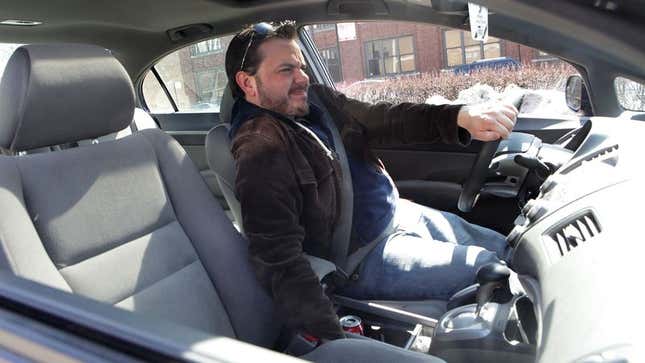
CAMBRIDGE, MA—A study released Monday by neurologists at the Massachusetts Institute of Technology has concluded that human beings display their highest range of cognitive capabilities when attempting to retrieve an object accidentally dropped into the narrow space between car seats.
The groundbreaking research paper revealed that most individuals are able to perform extremely complex and otherwise unattainable feats of spatial awareness, tactile sensitivity, and problem solving when faced with reclaiming an item lost within the cramped slot between two automobile seats, or between either the driver or passenger seat and the vehicle’s center console.
“While the average person only draws on about 10 percent of their maximum neural capabilities when engaging in most day-to-day challenges, our research showed that the same individual, when attempting to recover a cell phone or parking stub that has slid deep into the crack between car seats, uses nearly his or her entire brain,” said professor of neuroscience and the study’s lead author James DiCarlo, noting that test subjects utilized the uppermost limits of their perceptive, deliberative, and rational faculties when considering how to regain a wallet or sunglasses lying just beyond reach. “In fact, the instant that our subjects lost an item to one of a car’s various crevasses, they immediately called up a battery of sensory sensitivities, planning abilities, and motor skills that the brain is, according to our studies, only able to unlock in these very scenarios.”
“What we observed under these conditions represents the very pinnacle of the human brain’s vast potential,” DiCarlo added.
As documented in the study, individuals who were faced with the recovery of a lost credit card or tube of chapstick were able to engage their full capacity for logic and critical thinking, most especially in those situations in which they were just barely able to graze the article with their fingertips while understanding that any improper move would only drive the item down farther into the gap.
While test subjects reportedly demonstrated a far-greater-than-average capacity for strategic foresight when attempting to pincer an object between their middle and index fingers, researchers noted that cognitive facilities truly reached their peak during situations in which one opted to twist his or her arm beneath the seat and come at the lost item from below.
According to the study, advanced neuroimaging revealed that tens of trillions of synapses were firing in the cortexes of those attempting to extricate a roll of mints from the area around the metal tracks that hold a car’s seat in place, with the entire brain “lighting up” with activity when the subject employed an ice scraper as an extension of his or her arm or moved the seat backward in an effort to gain greater access to the difficult-to-reach object.
“When our test subjects engaged in extended, purposeful maneuvers in order to retrieve a pen or one’s last quarter for a toll booth, our MRI machines detected a surge of brain activity that we did not even know the organ was capable of producing,” DiCarlo said, noting that the mental processes observed under these circumstances eclipsed “by leaps and bounds” the cerebral functions seen when a subject studied for an examination, solved a complex math problem, or played a game of chess. “In addition, we found that when an individual climbed into the backseat, lay down on the floorboard, and blocked out all other sensory stimulation while carefully fishing for a grocery list, the volume of active neurons recorded in this scenario charted higher than anything I or my colleagues had ever seen.”
“If we could somehow harness the cognitive power on display in such circumstances, there’s no telling what the human race could accomplish,” the neuroscientist continued.
Though DiCarlo stated that his group’s findings were impressive, he emphasized that the remarkable neural capabilities observed in this study only narrowly surpassed the findings of previous research into the brain activity of those maneuvering a couch up a stairwell, unlocking and opening one’s front door while both arms are laden with heavy grocery bags, and attempting to snake the dislodged drawstring on a pair of sweatpants back through the opening.